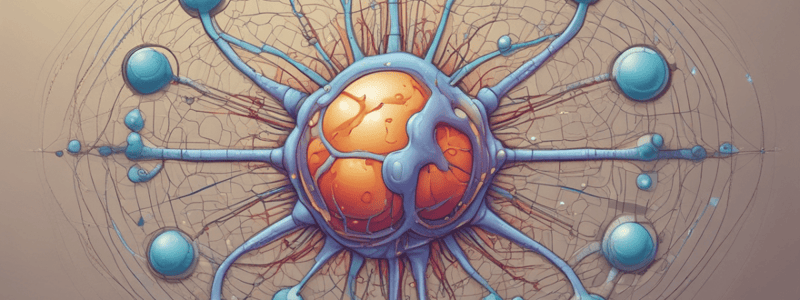Podcast
Questions and Answers
Which of the following muscarinic receptors is responsible for increased salivary secretion?
Which of the following muscarinic receptors is responsible for increased salivary secretion?
- M3 (correct)
- M2
- M1
- M4
What is the mechanism of action of muscarinic agonists?
What is the mechanism of action of muscarinic agonists?
- Inhibit G-protein coupled receptors
- Activate G-protein coupled receptors (correct)
- Block the action of acetylcholine
- Inhibit the release of acetylcholine
Which of the following is an effect of muscarinic antagonists on the M2 receptor?
Which of the following is an effect of muscarinic antagonists on the M2 receptor?
- Increases heart rate (correct)
- Has no effect on heart rate
- Decreases heart rate
- Increases cardiac contractility
What is the effect of muscarinic agonists on the M1 receptor?
What is the effect of muscarinic agonists on the M1 receptor?
Which receptor is responsible for the relaxation of smooth muscle in the bronchi?
Which receptor is responsible for the relaxation of smooth muscle in the bronchi?
What is the primary effect of muscarinic agonists on the M3 receptor?
What is the primary effect of muscarinic agonists on the M3 receptor?
Which of the following muscarinic receptors is primarily responsible for the regulation of heart rate?
Which of the following muscarinic receptors is primarily responsible for the regulation of heart rate?
What is the effect of muscarinic antagonists on the M1 receptor?
What is the effect of muscarinic antagonists on the M1 receptor?
Which of the following is a characteristic of muscarinic agonists?
Which of the following is a characteristic of muscarinic agonists?
What is the effect of muscarinic antagonists on the M4 receptor?
What is the effect of muscarinic antagonists on the M4 receptor?
Flashcards are hidden until you start studying
Study Notes
Muscarinic Agonists
- Mimic the action of acetylcholine (ACh) on muscarinic receptors, increasing the response
- Examples: Bethanechol, Carbachol, Pilocarpine, Muscarine
- Mechanism of action: Bind to muscarinic receptors, activating G-protein-coupled pathways, leading to increased smooth muscle contraction, glandular secretion, and neuronal activity
- Actions on specific muscarinic receptors:
- M1 receptors: Increase cognitive function, improve memory, and enhance neuronal activity
- M2 receptors: Decrease heart rate, reduce cardiac contractility, and slow atrioventricular conduction
- M3 receptors: Stimulate smooth muscle contraction, increase glandular secretion, and regulate blood pressure
- M4 receptors: Modulate dopamine release, influence motor control, and regulate emotional responses
- M5 receptors: Involved in regulating smooth muscle tone, particularly in the bladder and gastrointestinal tract
Muscarinic Antagonists
- Block the action of acetylcholine (ACh) on muscarinic receptors, decreasing the response
- Examples: Atropine, Scopolamine, Tropicamide, Ipratropium
- Mechanism of action: Competitively inhibit the binding of ACh to muscarinic receptors, reducing G-protein-coupled signaling and subsequent physiological responses
- Actions on specific muscarinic receptors:
- M1 receptors: Impair cognitive function, particularly memory and attention
- M2 receptors: Increase heart rate, enhance cardiac contractility, and accelerate atrioventricular conduction
- M3 receptors: Relax smooth muscle, decrease glandular secretion, and reduce blood pressure
- M4 receptors: Modulate dopamine release, influencing motor control and emotional responses
- M5 receptors: Relax smooth muscle tone, particularly in the bladder and gastrointestinal tract
Studying That Suits You
Use AI to generate personalized quizzes and flashcards to suit your learning preferences.




